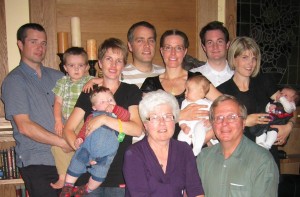Finding your niche
 It snowed again today. Record rainfall made life difficult for some farmers in southwest Saskatchewan during the spring and summer of 2010, but for now the extra moisture just seems to add to the beauty.
It snowed again today. Record rainfall made life difficult for some farmers in southwest Saskatchewan during the spring and summer of 2010, but for now the extra moisture just seems to add to the beauty.
There is enough snow on Brent and Colleen Eliason’s roof to make you feel like you are perched high on a hillside somewhere in the Swiss Alps. Climbing on top of all that fresh snow, you would be able to see the river hill to the north, blanketed with snow and banking down towards Lake Diefenbaker just a few miles away. A scenic view nonetheless.
It is Saturday morning and there is a warm, snug feeling inside the Eliason’s house on their farm. Brent has chores to do later on in the morning, and Colleen is already preparing for guests in the evening, but for now, we have time to talk. Brent leans back in the rocking chair as Colleen makes sure that everything is okay in the kitchen for awhile. Jerry and Liz Dennill just happen to be coming over for supper tonight. Jerry is presently the director at West Bank Bible Camp; a camp started in 1944 by the Mennonite Brethren.
Brent has been on the camp board for 12 years, 2 years as the “reluctant acting chairman.” Colleen has been volunteering in the camp kitchen for even longer than that. She has been around long enough to remember the old camp kitchen and dining hall. “It went from a 2 to a 10,” she said.
Growing Up
If you are thinking that Eliason doesn’t exactly sound like a traditional Mennonite name, you would be right. Scandinavian is a label that might come to mind.
Brent Eliason grew up on a small mixed farm in central Alberta near Wetaskiwin. He was the oldest in a family of three. “I always enjoyed farming and enjoyed my life at home. I had a good family,” he offers, by way of introduction. One of the things he really enjoyed was working together on the farm.
Their family attended a small evangelical church originally affiliated with the Swedish Mission; you could expect to see between 50 and 60 people on a Sunday morning. The influence of this congregation, together with Inter-Varsity Christian Fellowship and a local Christian camp is what propelled him to accept Christ and live as a Christian.
Colleen Olson was raised on a slightly larger mixed farm in southwest Saskatchewan, 30 miles north of Swift Current. Her family was also larger. She had five older brothers, one older sister, and two younger sisters. There were a number of large families in the area in those days, and her world, she says, was quite small. The Lutheran church she attended with her family was half a mile away. The Hovdestad School, where she received her kindergarten through grade 11 education – a mile and a half.
They would walk, ride horses, or travel by a horse-drawn sled on the way to school; although, in the later years, she got to ride in a car. The family car came in handy on other occasions. The Christian camp she attended was sponsored by a Lutheran church in Elbow, Saskatchewan, an hour and a half away.
Stepping Out
Upon graduation from high school, it would be 13 years before Colleen could return to her roots, while Brent would never return to live where he grew up.
“It is interesting,” Brent said, “to see where life takes you.
Brent and Colleen would finally meet in Vancouver at the University of British Columbia. IVCF and the West Point Grey Baptist Church provided the opportunity. They were married in 1974. This was also the year that Brent graduated with a master of science in mechanical engineering degree. Colleen had obtained an education diploma with a focus on special education for the hearing impaired in 1973.
During the summer of 1975 they volunteered at Pioneer Lodge, an IVCF camp near Sundre, Alberta. Brent had counseled at this camp for 4 years while going to the U of A . “Every summer job, it worked out that I was able to get off for two weeks to go and work at the camp,” he said. “It was interesting to see how God worked that out.”
They lived in Calgary for 3 years as a young married couple. During that time, Brent worked for a gas pipeline company now known as Nova. But he has always wanted to farm. Eventually, it worked out for Brent to team up with Colleen’s brother, Gordon, at Deer Range Farms in Saskatchewan. Fixing things and farming goes hand in hand. Brents engineering background was going to come in handy.
Settling In
Raising pure-bred Red Angus cattle, operating a grain farm, working a farm debt consulting job on the side, and – perhaps most importantly – raising a family, now became the focus. Three girls graced the Eliason household: Rachael, Ruth, and Esther.
Colleen actually got involved at West Bank Bible Camp because of her daughter’s allergic reaction to eggs. Colleen had helped run a catering company before, so when Ruth decided to go to camp, she decided to help out in the kitchen to “…keep a closer eye on Ruth and what she was eating.” That is how it all got started.
Bridgeway became their church home later on when their country church closed due to lack of numbers. Brent got involved at WBBC because he was asked to serve on the board. West Bank is operated by Mennonite Brethren churches in southern Saskatchewan, as well as other interested congregations in the area, and so Bridgeway had a representative on the board. When the position became vacant, the church asked Brent if he wanted the job.
“I thought it was a good fit for me in terms of ministry, because I believe in camping and had been involved in camping all of my life.” Simply asking people to help out sometimes makes all the difference.
Approximately 300 out of the 600 campers in the 2010 camping season came from non-churched homes, and this gets Brent fired-up: “To me, that is the main reason why we do camping. It is an opportunity to bring the gospel to kids who have never darkened the door of a church,” he said.
There are other important aspects of camp as well, he acknowledges. Encouraging Christian young people at a critical stage in their lives is one of them. Providing a place to nurture healthy relationships, a place to grow in your Christian faith and feel like you belong, is another. All sorts of secondary reasons come up in the conversation.
Together we can make something that none of us can make on our own
“The money part of it is the part I struggle with the most,” Brent admits, reflecting on some of the challenges involved with Christian ministry. The budget for the camp is $250,000 per year. That is a lot of cash to come up with. The camper fees cover about 50 percent and the rest has to come from people who are interested in the ministry.” He goes on to talk about how the Mennonite Brethren denomination has provided funding for much needed capital projects, including the new kitchen. “This camp could not function without the help of the conference,” he said.
Getting Excited
“I started out thinking I wanted to be a social worker…but that wasn’t what really interested me,” Colleen states. “Then, I was asked to be a teacher’s aid and found out that I really, really liked that. So I went in that direction.”
After her daughters grew up she got back into teaching. She interpreted for a deaf student in Success, Saskatchewan for 2 years and went on to teach at the Swift Current Hutterite Colony for 11 years. She feels that her passion for working with kids and her training in that area has helped in her present role as the coordinator for the Junior Sunday School at Bridgeway.
When it came to West Bank, she got involved where her kids were involved. “I had experience cooking. I enjoy cooking. The camp needed cooks. You fit in where you feel like you can,” she said. Reflecting on her many years at West Bank Bible Camp she adds, “To me, it has been amazingly positive.”
“It is interesting,” Brent said, “to see where life takes you. You have some interests, but you wouldn’t necessarily have guessed what you are going to end up being excited about doing.” As it turns out, Brent has discovered that he really enjoys two things: a challenge…and music. Doing sound at the church, making musicians sound as good as they can – that is what gets him excited. His daughters Ruth and Esther recently organized a concert of Christmas music at Bridgeway, and Brent did the sound. “I was on a high for 6 hours afterward,” Brent exclaimed, “I couldn’t sleep!” “But he will also rise to the challenge of a broken dishwasher,” Colleen adds in a hurry.
At West Bank, working along side other people sounds very much like a highlight for Brent. “There are so many good people involved in the camping ministry,” Brent raves. “I can’t think of anybody that I don’t really like.” Jerry is more of the visionary, whereas Brent sees himself as a “nuts & bolts” kind of guy; making the kitchen work better, that kind of thing. It takes all sorts of people, and lots of them, to make West Bank Bible Camp a success.
“God is faithful,” Brent said quickly and quietly when asked about the theme of our conversation. And then Colleen wraps it up with this:
“Every worker, every person who contributes in any way, is important. It is like the body, you know, the toe isn’t any less important than the mouth. Together we can make something that none of us can make on our own. For me, I just want to be part of that, to do what God has called us to do…to be part of that.”
Amen sister.
*A shorter version of this article is available in the Mennonite Herald, April 2011 edition
© Career & Life Direction 2012. All rights reserved.

